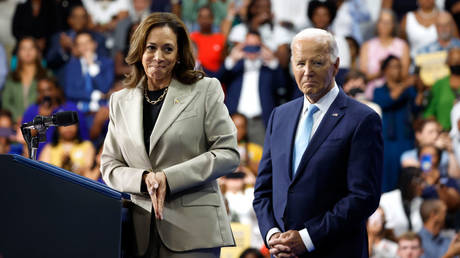The policy document still includes a host of promises for Joe Biden’s “second term”
Democratic delegates have voted to approve the party’s 2024 platform. The 94-page document still states that President Joe Biden is running for office, mentions Donald Trump more than Kamala Harris, and includes multiple false and misleading claims.
The 91-page document was compiled in July and published on Sunday. In a largely symbolic vote at the Democratic National Convention on Monday, it was approved as the party’s official platform for the next four years.
A woke introduction The platform opens with a so-called “land acknowledgement,” declaring that the US is made up of “lands that have been stewarded through many centuries by the ancestors and descendants of Tribal Nations who have been here since time immemorial.”
“While we meet in Chicago, we also recognize and honor the traditional homelands of the Anishinaabe, also known as the Council of the Three Fires: the Ojibwe, Odawa, and Potawatomi Nations,” it continues, before listing off other Native American tribes hailing from the Chicago region.
Originating on university campuses, ‘Land acknowledgements’ have been embraced by progressive politicians and nonprofits in recent years. Conservatives have mocked the practice as overly politically correct, while some leftists have argued that land acknowledgements don’t go far enough, and should be backed by cash reparations.
Biden still in the race? The platform refers to Biden as the Democratic Party’s candidate at least 20 times, despite the 81-year-old suspending his campaign and endorsing Vice President Harris to run in his place last month.
“President Biden, Vice President Harris, and Democrats are running to finish the job,” the platform’s second page declares, before listing a host of the president’s priorities for his “second term in office,” which include nominating more “diverse” judges and offering a pathway to citizenship for illegal immigrants.
Regina Romero, the co-chair of the convention’s platform committee, told delegates that the document was written “prior to the president passing the torch in an act of love and patriotism,” and despite its mistakes remains a “forward-looking vision for our party that echoes the voice of all.”
These references to Biden are “an open admission that Kamala has no policies of her own. She has no plan to fix the litany of crises she’s created,” Trump campaign spokesman Dylan Johnson said in a statement on Monday.
All about Trump Throughout the platform, Biden’s record is repeatedly contrasted with Trump’s. Lines such as “while President Biden has stood up to the gun lobby, Trump is proud of doing their bidding” and “while President Biden has sought to appoint judges who look like America, three-quarters of Trump’s judicial appointees were men and 84 percent were white” appear on almost every page of the document.
In total, Trump is mentioned 150 times in the platform, while Harris’ name appears only 32 times. Biden is named 287 times.
No Harris policies All of the platform’s post-election promises are attributed to Biden, with the document omitting Harris’ recent economic proposals, which include financial assistance for first-time home buyers, a $6,000-per-child tax credit, and price controls on groceries.
READ MORE: Trump blasts Harris on inflation
In the month since Biden ended his campaign, these economic proposals are the only policies Harris has announced. By contrast, Biden, Trump, and Hillary Clinton had all published extensive policy documents by this stage of the 2020 and 2016 election cycles.
Hoaxes and falsehoods The document contains numerous mistruths and outright falsehoods, particularly about Trump. It claims, as Biden has in his speeches, that Trump called members of the military who died in war “suckers” and “losers,” and that he called neo-Nazi protesters “very fine people.” Neither anecdote is true.
Biden and Harris’ accomplishments are similarly embellished. For example, the document claims that the president and vice president are “finally rebuilding” broadband infrastructure in the US, despite the fact that zero new connections have been built since Harris was appointed to lead the $42 billion initiative in 2021, according to Federal Communications Commission chief Brendan Carr.





